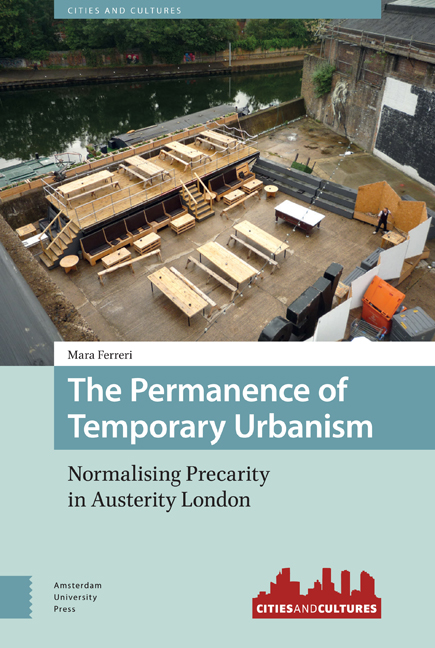5 - Planning a Temporary City of On-Demand Communities
Published online by Cambridge University Press: 13 April 2021
Summary
Abstract
The chapter explores how temporary urban ideas and values have become embedded in urban planning policy. It examines the institutionalisation of pop-up and temporary places in post-2008 London policymaking. It particularly draws on policy analysis, participant observations and interviews with public agencies, professionals and community organisations involved in the redevelopment of the London 2012 Olympics neighbourhoods. The case of a youth-oriented temporary community space is taken as emblematic of a shift towards increasingly short-term public provision at the margins of longer-term privatisation. It concludes that the imaginary of pop-up participation follows an ‘on-demand’ logic that sits uncomfortably with the needs and demands of urban communities affected by austerity policies and that risks ushering in further exclusion and precarisation.
Keywords: urban planning, on-demand, community, precarisation, London 2012 Olympics
Temporariness in planning at times of austerity
In the relatively short temporal arc traced over the course of this book, temporary urbanism has been discussed as a heterogeneous field of practice. Urban planning is one of the disciplinary origins and a constant element in the development of a shared discourse on temporary urbanism: from the urban regeneration officers involved in setting up the Meanwhile Project to local boroughs promoting ad hoc developments, such as Hackney's Art in Empty Spaces or Newham's Meanwhile London competition, to various development agencies acting as commissioners or discursive intermediaries. Planning is the realm where references to temporary uses of land and buildings was most common: short-term commercial and non-commercial uses of vacant buildings and land have always been part of the cultural and economic landscape of cities. However, it is only recently that interim, temporary and meanwhile uses have started to be defended as key tools of urban regeneration and as capable of bringing long-term community benefits, often through collaborations with civic and third-sector organisations. Temporary urban projects, it is argued, are ideal for community-oriented activities, and forms of collaboration can enable more environmentally sustainable and participatory ways of designing, delivering and organising space. The embedding of temporary projects in future planning, in this view, would open up the possibility for them to be more than a ‘creative filler’ and become a transformative component of a longer-term community-oriented programme.
- Type
- Chapter
- Information
- The Permanence of Temporary UrbanismNormalising Precarity in Austerity London, pp. 117 - 144Publisher: Amsterdam University PressPrint publication year: 2021



